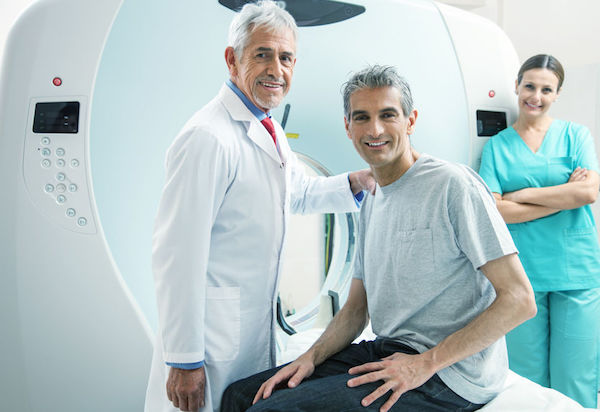Prostatitis is inflammation of the prostate gland, which can develop in men of all ages.

A vital part of a man’s reproductive system, the prostate is a walnut-sized gland situated between the bladder and the root of the penis that secretes seminal fluid that nourishes and protects sperm.
Prostatitis causes may include a bacterial infection (in 5 to 10% of cases), which is classified as either acute or chronic. Other risk factors for inflammation may include:
- An enlarged prostate
- A recent bladder (urinary tract) infection
- An abnormal urinary tract
- The use of a medical instrument, such as a catheter, which is inserted in the urethra to drain urine from the bladder
- Anal intercourse.
Prostatitis is regarded as chronic if it persists for three weeks or longer. Prostatitis does not raise the risk of prostate cancer.
What are its symptoms?
Prostatitis symptoms include the following:
- Urge to urinate frequently
- Difficulty urinating
- Burning or pain during urination
- Chills and fever
- Intermittent groin pain or pain in the lower abdomen
- Blood in the urine
- Painful ejaculation (less common)
Prostatitis may present with little or no symptoms or very severe symptoms requiring immediate medical care.
How is it diagnosed?
If prostatitis is suspected, your GP might refer you to an urologist, a doctor who specialises in the urinary tract and the male reproductive systems to confirm the diagnosis.
The medical examination will involve a digital rectal exam to evaluate if the prostate gland is enlarged. Further tests may be performed, such as a prostate fluid analysis (this tests the prostate for signs of infection), a transrectal ultrasound, a biopsy and/or a urine analysis to determine which part of the urinary tract is infected.
What are your treatment options?
Treatment will depend on the type of prostatitis you have, that is, whether it is a result of a bacterial infection or other causes.
For chronic prostatitis that is not caused by a bacterial infection, anti-inflammatory drugs may be prescribed, and warm sitz baths (a warm, shallow bath to help relieve pain) may be recommended.
Antibiotics will be prescribed, usually for 14 to 21 days for acute infectious prostatitis, after which the infection usually clears up. Chronic infectious prostatitis will require antibiotics for a longer period of time, from four to 12 weeks.
Pain medication and muscle relaxants may be prescribed to reduce painful symptoms as well as difficulty urinating. In extreme cases, surgical removal of the infected portion of the prostate gland may be recommended.
It’s advised that once the prostatitis has cleared up that patients continue with follow-up visits to their doctors if recommended.
Can it be prevented?
The best way to prevent prostatitis is to avoid the risk factors associated with the condition, which include the following:
- If you suspect you have a urinary tract infection, or UTI, (symptoms include cloudy, malodorous urine and a burning sensation when urinating), visit your doctor and complete any course of medication prescribed
- Drink plenty of water to keep the flow of urine constant
- Practise safe sex when engaging in anal intercourse
- Practise good hygiene in the genital area
- Maintain a balanced diet (low in saturated fats) and exercise regularly
- Probiotics and certain other supplements promote prostate health, so speak to your healthcare practitioner about additional supplementation.
IMAGE CREDIT: 123rf.com
